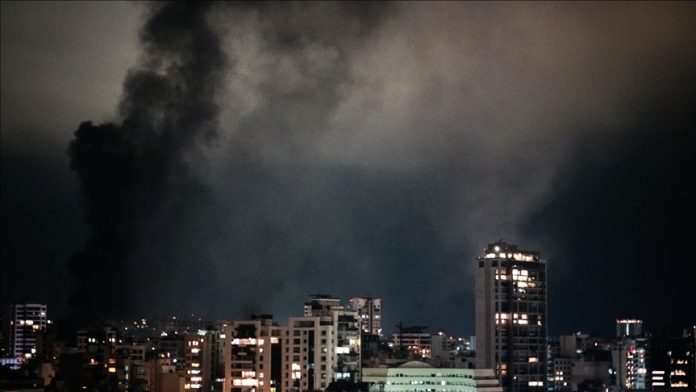The Israel Air Forces sustained massive airstrikes on various parts of Lebanon on Saturday, causing widespread destruction to civilian infrastructure and loss of life. Security guarantees for UN peacekeepers in the country are at risk.
On Saturday, the Israeli military ordered residents of 23 villages in southern Lebanon to evacuate to areas north of the Awali River, which stretches from the western Bekaa Valley into the Mediterranean Sea. Israeli warplanes also continued their offensive airstrikes on various parts of Lebanon. Throughout Saturday, the strikes killed more than a dozen people in different parts of the country, adding to the list of victims of the ongoing attacks. At least 15 people were killed and 37 injured in Israeli strikes on three different areas of Lebanon, Lebanon’s Health Ministry said on Saturday.
Al Mayadeen newspaper reported that the blast occurred near the southern city of Sidon and targeted a residential building in Bqosta, but the flat that met the strike was empty. On the other hand, reports indicate that four people were injured in the attack and search and rescue operations are still ongoing.
The towns of Maqneh and Younin, north of Baalbek in eastern Lebanon, suffered airstrikes. In the eastern Bekaa region, 321 people have been killed since the start of the Israeli war in Lebanon. The south of the country has also come under heavy attacks. The towns of Zifta, Nabatiyeh, and Ayta al-Shaab were among the casualties.
The Health Ministry said five hospitals suffered damage from Israeli airstrikes in the eastern city of Baalbek and the Bekaa Valley. The information has not yet been confirmed by either side. However, at least 50 paramedics have been killed since Israel launched its latest attacks on Lebanon. They were all health care workers affiliated with either Hezbollah or Amal, another Shiite political party.
In addition, clashes along the Lebanon-Palestine border took place throughout the night as Israeli military forces continued to attempt to infiltrate into Lebanese territory but failed whenever they encountered Hezbollah fighters.
Israel on Saturday also claimed, without providing any evidence, that Hezbollah fighters were using ambulances to transport themselves and weapons. Earlier, an Israel Defence Forces spokesman threatened in Arabic that it would attack any vehicle carrying armed men, regardless of its type. Hezbollah fired about 320 shells from Lebanon into Israel on Saturday, Israel reported, without providing further details. They declared areas around some towns in northern Israel closed to the public.
UN peacekeepers in danger
In a joint statement, 34 countries contributing to the UN Interim Force in Lebanon (UNIFIL) on Saturday urged the protection of UN peacekeepers amid rising tensions in the region. Brazil, China, France, Turkey, Turkey, Britain and others reaffirmed their full support for the UNIFIL mission to ensure stability in southern Lebanon and promote peace.
The statement, initiated by Poland, condemned recent attacks on peacekeepers, saying:
Such actions must stop immediately and should be adequately investigated. We reiterate our commitment to multilateral cooperation with the UN at its core. We call for respect for the international law, in particular the Charter of the United Nations as well as the relevant resolutions of the Security Council.
The statement comes as another member of UNIFIL, the UN peacekeeping mission in Lebanon, was wounded by gunfire on Friday, the organisation said on Saturday. It added that the man’s condition is stable after surgery to remove the bullet. The UNIFIL position in the southern Lebanese town of Ramyah suffered significant damage due to explosions after a nearby shelling, but it did not specify who was responsible for both attacks.
On Thursday and Friday, four UN peacekeepers were injured when the Israeli military shelled the headquarters in southern Lebanon, prompting condemnation from the world body and various countries.
The conflict between Israel and Hezbollah militants erupted a year ago when the Iranian-backed group began firing rockets into northern Israel in support of Hamas at the start of the Gaza war. The situation has worsened in recent weeks, with Israel bombing southern Lebanon, Beirut’s southern suburbs and the Bekaa Valley, killing top Hezbollah leaders and moving ground troops across the border.
